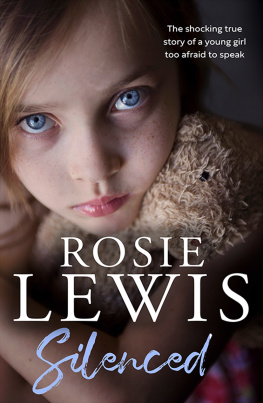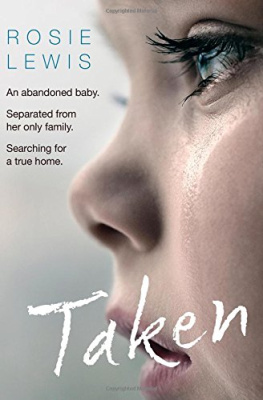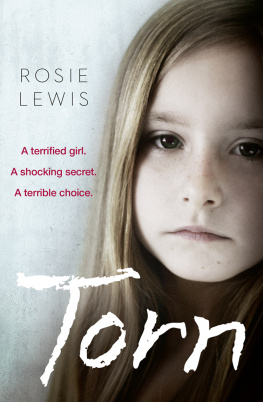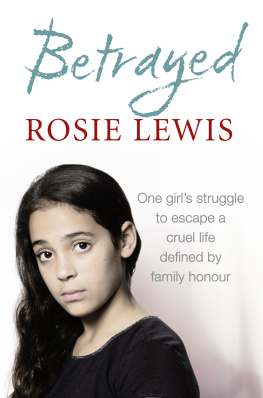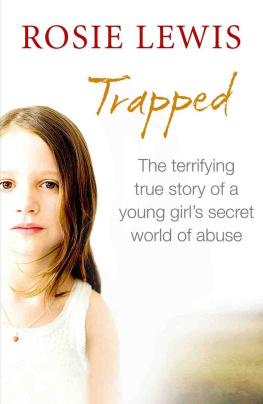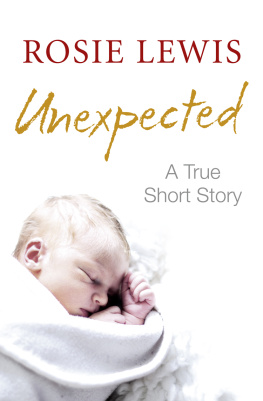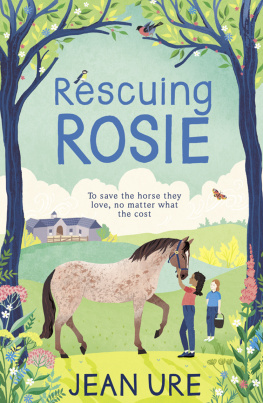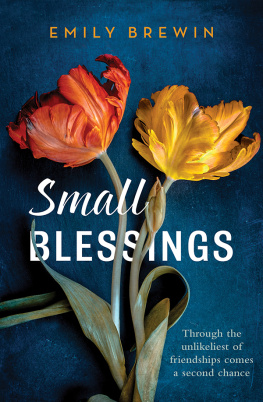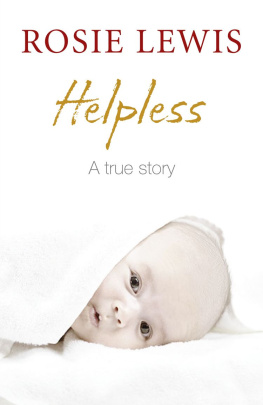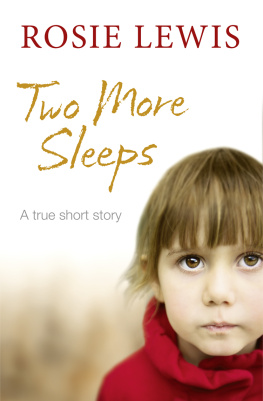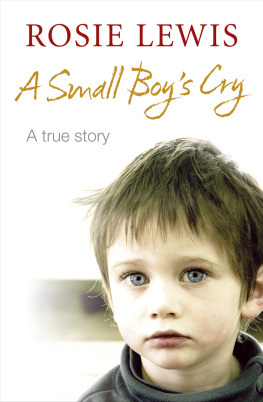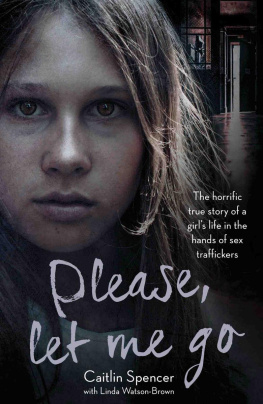Certain details in this story, including names, places and dates, have been changed to protect the familys privacy.
HarperElement
An imprint of HarperCollinsPublishers
1 London Bridge Street
London SE1 9GF
www.harpercollins.co.uk
HarperCollinsPublishers
1st Floor, Watermarque Building, Ringsend Road
Dublin 4, Ireland
First published by HarperElement 2022
FIRST EDITION
Rosie Lewis 2022
Cover layout design HarperCollinsPublishers Ltd 2022
Cover photograph Kelly Silaste/Arcangel Images (posed by a model)
A catalogue record of this book is available from the British Library
Rosie Lewis asserts the moral right to be identified as the author of this work
All rights reserved under International and Pan-American Copyright Conventions. By payment of the required fees, you have been granted the nonexclusive, non-transferable right to access and read the text of this e-book on screen. No part of this text may be reproduced, transmitted, downloaded, decompiled, reverse engineered, or stored in or introduced into any information storage retrieval system, in any form or by any means, whether electronic or mechanical, now known or hereinafter invented, without the express written permission of HarperCollins e-books.
Find out about HarperCollins and the environment at
www.harpercollins.co.uk/green
Source ISBN: 9780008538422
Ebook Edition July 2022 ISBN: 9780008538439
Version: 2022-06-29
This ebook contains the following accessibility features which, if supported by your device, can be accessed via your ereader/accessibility settings:
- Change of font size and line height
- Change of background and font colours
- Change of font
- Change justification
- Text to speech
- Page numbers taken from the following print edition: ISBN 9780008538422
Helpless (e-short)
Trapped
A Small Boys Cry (e-short)
Two More Sleeps (e-short)
Betrayed
Unexpected (e-short)
Torn
Taken
Broken
To my children;
I love you to the moon and back.
My main consideration when sharing my experience of fostering is to protect the identity of the children I care for. Thats why some details in the following case have been changed, as well as names and locations. The rest is a true account of my time with the Powell family.
I shy away from using the word evil because were all a product of many factors over which we have little or no control. The abuse in this case, however, was so calculated and sadistic that its hard to think of any other way to describe it, or to find empathy in my heart for the perpetrator.
One of the lessons Ive learned in the last two decades of fostering is that abused children are often highly skilled at masking their pain. I hope that by shining a light into dark places well get better at recognising the tell-tale signs of a child in crisis. Its nice to think that this insight might also inspire some readers to embark on their own fostering journey.
Fostering has its challenges but the wonderful young people who have come through our door over the years have changed our lives immeasurably for the better.
The book flies through the air, seemingly out of nowhere.
I dodge out of the way, thinking for one disorientating moment that Im the intended target. Shrinking behind the straggly bush growing over the Powells front gate, I tighten my coat around myself and squint up at the small terraced house in front of me. A curtain shivers at the open first-floor window. Another book shoots through the gap. It hits the slush-covered pavement with a thud, quickly followed by a yellow plastic truck.
Raised voices reach my ears. My heart quickens as a tall figure flits into view. A series of low thumps follows.
The scant details in the profile Ive been given about the family on the other side of the walls come to mind as my eyes run over the rusted guttering and peeling paintwork.
Two-year-old Louis is first to my thoughts. I hope hes nowhere near the gaping window. He and his siblings, Bartley, ten, nine-year-old Caitlin and Ethan, six, had been identified as children in need (CIN) a couple of years ago, after Bartley lashed out at his sister so violently that she needed treatment in A&E.
A child in need is a replacement of the old at risk term that was seen by many as pejorative. Children are classified as CIN if a family assessment reveals that their development is likely to be impaired without targeted intervention. Social services have a duty to safeguard and promote the welfare of CIN with the external provision of services.
It doesnt always work, and in the Powells case a recent crisis brought everything to a head. Two nights ago, police received an anonymous tip-off that the children had been left home alone. Their mother, Bonnie Powell, was sectioned under the Mental Health Act after being found wandering the icy late-February streets half-dressed and stoned in the early hours.
Julie and Ryan Chambers, Bonnies mother and stepfather, quickly stepped into the breach, but supervision has been deemed necessary while they are assessed as kinship carers.
Cue a specialist foster carer from the recently implemented Mockingbird scheme. Besides offering social workers a window into how well the Powells function as a family, my task is to offer non-judgemental support to Julie and Ryan while they adjust to their new responsibilities. Signposting them to services that might help them negotiate the tricky weeks ahead and acting as a single point of contact with social services will hopefully aid communication. By reducing pressure on the family, were mitigating the risk of the children coming into full-time care. Thats the idea anyway, provided I can make it safely into the house, that is.
When Ive reassured myself that there are no further missiles in-flight, I pick my way cautiously over the books and toys littering the front path. Im about to knock on the door when a scowling, ferrety-looking man yanks it open. He slams it to a close just as he registers my presence. Fuck! he says. We blink at each other in surprise, then he mutters an apology and stamps off down the path.
I ring the doorbell, wondering whether Ive just met Ryan Chambers. Whoever it was, theyve left a pungent smell of cannabis behind. My heart flutters as I smooth down my unruly blonde and grey curls and blink a few stray flakes of snow out of my eyes.
Ever since I began task-based fostering almost two decades ago, Ive felt a mixture of anxiety and excitement at the prospect of taking on a new placement. Its 2019 and just one week into my new role on the special scheme designed to keep struggling families together, Im wary of what might be awaiting me on the other side of the door. I feel vulnerable, and my stomach twists at the clatter of approaching footsteps. Its a valuable insight into the minds of the children I foster, waiting on the doorstep to meet their temporary guardian for the first time, when all thats familiar has been stripped away.
As soon as the door opens and I catch sight of Julie Chambers, however, my nerves fall away.
Almost a foot taller than me and slim in a fitted blouse and black jeans, the childrens grandmother smiles warmly as she invites me into the narrow hall. Theres no outward sign of the strain she must be under with her daughter in hospital and four extra children to care for.

